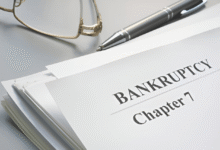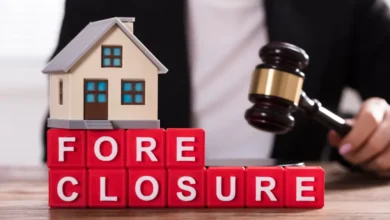How Does Bankruptcy Affect Your Job and Future Credit

Bankruptcy, a financial undertaking often approached with trepidation, extends its impact far beyond the realm of one’s economic standing. In this exploration of the intricacies surrounding bankruptcy, we delve into a crucial facet – its profound effects on both employment prospects and future credit. As individuals navigate the challenging terrain of financial reorganization, questions inevitably arise: How Does Bankruptcy Affect Your Job and Future Credit? What are the lasting implications on one’s creditworthiness? Join us on a comprehensive journey as we unravel the complex dynamics of how bankruptcy intertwines with your professional trajectory and shapes the landscape of your credit future.
Understanding Bankruptcy: A Brief Overview
Bankruptcy is a legal proceeding that provides individuals and businesses overwhelmed by debt with a fresh start. There are different types of bankruptcy, with Chapter 7 involving liquidation and Chapter 13 focusing on reorganization. Each type has distinct implications for your financial landscape.
The Job Impact of Bankruptcy
Employer Considerations
Employers may be concerned about hiring someone with a bankruptcy history. However, legal protections exist to prevent discrimination based on bankruptcy status. Understanding these protections is crucial for individuals seeking new job opportunities.
Legal Protections for Employees
Employees undergoing bankruptcy enjoy certain legal safeguards. It’s essential to be aware of your rights and ensure that employers adhere to anti-discrimination laws during the hiring process and beyond.
Credit Score and Report: Navigating the Financial Landscape
How Bankruptcy Affects Credit Scores
Bankruptcy can significantly lower credit scores, making it challenging to secure loans or credit cards. Understanding the mechanics of credit score calculation post-bankruptcy is vital for planning your financial recovery.
Long-Term Impact on Credit Reports
The impact of bankruptcy on credit reports is long-lasting. Knowing how this information is presented and understanding its implications will empower you to make informed decisions about your financial future.
Rebuilding Credit After Bankruptcy: Strategies for Success
Strategies for Improving Credit Post-Bankruptcy
Despite the challenges, there are effective strategies for rebuilding credit after bankruptcy. From secured credit cards to responsible financial habits, we’ll explore actionable steps to enhance your creditworthiness.
Importance of Financial Responsibility
Developing a sense of financial responsibility is critical to long-term credit health. We’ll discuss the habits and behaviours that contribute to sustained financial well-being.
Job Search Challenges: Overcoming Employer Concerns
Addressing Potential Employer Concerns
Job seekers with a bankruptcy history often face tough questions during interviews. We’ll provide tips on addressing employer concerns and effectively communicating your qualifications despite past financial challenges.
Tips for Explaining Bankruptcy in Job Interviews
Crafting a compelling narrative around your bankruptcy experience is crucial. We’ll share practical tips for articulating your story in a way that highlights personal growth and resilience.
Legal Rights and Protections: Navigating the Employment Landscape
Employee Rights During Bankruptcy
Understanding your rights as an employee during bankruptcy is vital. We’ll explore the legal protections in place to ensure fair treatment in the workplace.
Discrimination Protection Laws
An overview of discrimination protection laws related to bankruptcy will empower you to navigate potential challenges in your professional life.
Financial Counseling and Education: Building a Foundation for Recovery
Importance of Seeking Professional Advice
Professional financial counselling is invaluable during and after bankruptcy. We’ll discuss the benefits of seeking expert guidance and resources available to enhance financial literacy.
Educational Resources for Financial Literacy
Building a solid foundation of financial knowledge is crucial for long-term success. We’ll highlight resources and tools to boost your financial literacy and make informed decisions.
Read More: How to Understand Chapter 7 Bankruptcy
Emotional Impact: Navigating the Psychological Effects
Psychological Effects of Bankruptcy
Beyond the financial implications, bankruptcy can have profound psychological effects. Recognizing and addressing these emotions is essential for holistic recovery.
Coping Mechanisms for Individuals
Practical coping mechanisms and strategies to manage the emotional toll of bankruptcy will be explored, offering support for individuals facing this challenging journey.
Industry-Specific Considerations: Tailoring Strategies to Your Field
Varied Impacts on Different Professions
Different industries may have unique considerations when it comes to bankruptcy. We’ll delve into industry-specific challenges and provide insights tailored to your professional field.
Navigating Challenges in Specialized Fields
Professionals in specialized fields may encounter specific challenges. We’ll discuss strategies to overcome these hurdles and position yourself for success.
Real-Life Success Stories: Inspiring Narratives of Overcoming Challenges
Examples of Individuals Overcoming Job and Credit Challenges
Real-life success stories demonstrate that recovery is possible. We’ll share inspiring narratives of individuals who have overcome job and credit challenges after bankruptcy.
Inspirational Narratives for Readers
These stories serve as beacons of hope, inspiring readers to navigate their financial journeys with resilience and determination.
Creditors and Negotiation: Strategies for Debt Settlement
Communication with Creditors After Bankruptcy
Maintaining open communication with creditors is crucial. We’ll discuss practical strategies for negotiation and debt settlement post-bankruptcy.
Negotiation Strategies for Debt Settlement
Practical negotiation strategies will empower you to work with creditors to create manageable repayment plans, facilitating a smoother financial recovery.
Bankruptcy Alternatives: Exploring Options Before Filing
Exploring Alternatives Before Filing
Bankruptcy should be a last resort. We’ll explore alternative options, such as debt consolidation, and discuss their pros and cons to help you make informed decisions.
Pros and Cons of Debt Consolidation
Understanding the benefits and drawbacks of debt consolidation will enable you to assess whether it’s a suitable alternative to bankruptcy for your unique situation.
Long-Term Financial Planning: Setting Goals for Stability
Importance of Setting Financial Goals
Long-term financial planning is essential for stability. We’ll guide you in setting realistic goals and creating a roadmap for your financial future.
Building a Stable Financial Future Post-Bankruptcy
Practical steps and considerations for building a stable financial future will be explored, providing a blueprint for sustained success.
Read More: The Ins and Outs of Chapter 13 Bankruptcy
Conclusion
In conclusion, while bankruptcy can present significant challenges, it is not the end of your professional or financial journey. By understanding the complexities of job impacts and credit repercussions, you can navigate the path to recovery with resilience and determination. Remember, your story doesn’t end with bankruptcy – it’s an opportunity for a fresh start.
FAQs(How Does Bankruptcy Affect Your Job )
Can I still get a job after filing for bankruptcy?
Yes, bankruptcy doesn’t eliminate your ability to secure employment, but it may require thoughtful explanation during job interviews.
How long does bankruptcy stay on my credit report?
The impact of bankruptcy on your credit report can last up to 10 years, but its influence diminishes over time.
Are there specific industries more forgiving of bankruptcy histories?
Specific industries may be more understanding, but a proactive approach to addressing concerns is crucial in any field.
Can I rebuild my credit score after bankruptcy?
Yes, with strategic financial planning, responsible credit use, and time, you can rebuild your credit score.
What alternatives to bankruptcy should I consider before filing?
Debt consolidation, negotiation with creditors, and financial counselling are viable alternatives to explore.












One Comment